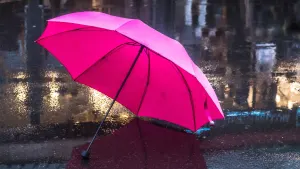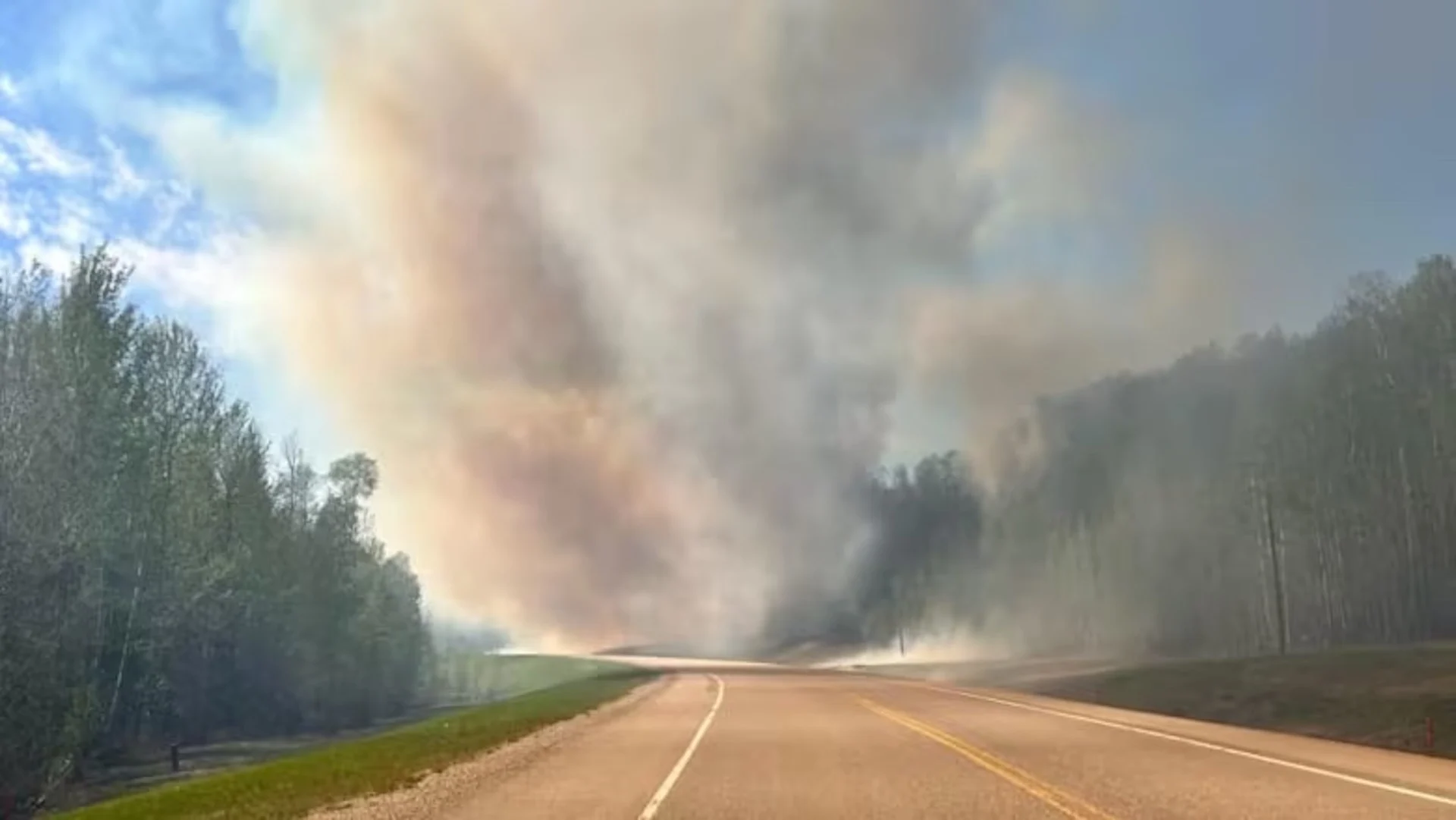
Thousands ordered to evacuate Fort Nelson, B.C., due to wildfire
The latest:
Residents of Fort Nelson, as well as the Fort Nelson First Nation, have been told to leave their homes immediately due to the threat of wildfire.
The Parker Lake Fire was about 12 kilometres west of Fort Nelson when the order was issued, shortly before 7:30 p.m. PT Friday. Mayor Rob Fraser said the fire had advanced to nine kilometres away shortly before midnight.
Evacuees are being told to drive south to Fort St. John's North Peace Arena, located at 9805 96 Ave.
Those who cannot drive themselves are urged to call 250-755-0933 for support. For emergencies, dial 911.
Some phone services have been knocked out by wildfires in the region.
Blackouts are expected as local power generation winds down.
Highways 97 and 77 north of Fort Nelson have both been closed due to wildfire.
Learn more about how to find the full list of wildfires, highway closures and evacuation orders and alerts.
CANADA'S WILDFIRES: Visit The Weather Network's wildfire hub to keep up with the latest on the active start to wildfire season across Canada.
More than 3,000 people were ordered to leave their homes Friday as a fast-growing wildfire advanced toward the community of Fort Nelson, part of the Northern Rockies Regional Municipality (NRRM) in northeast B.C, prompting an evacuation for the entire community as well as the neighbouring Fort Nelson First Nation.
The Parker Lake fire was about half a square kilometre in size at 5:25 p.m. PT Friday, but quickly grew to four square kilometres an hour later. By 10 p.m., it measured at eight square kilometres.
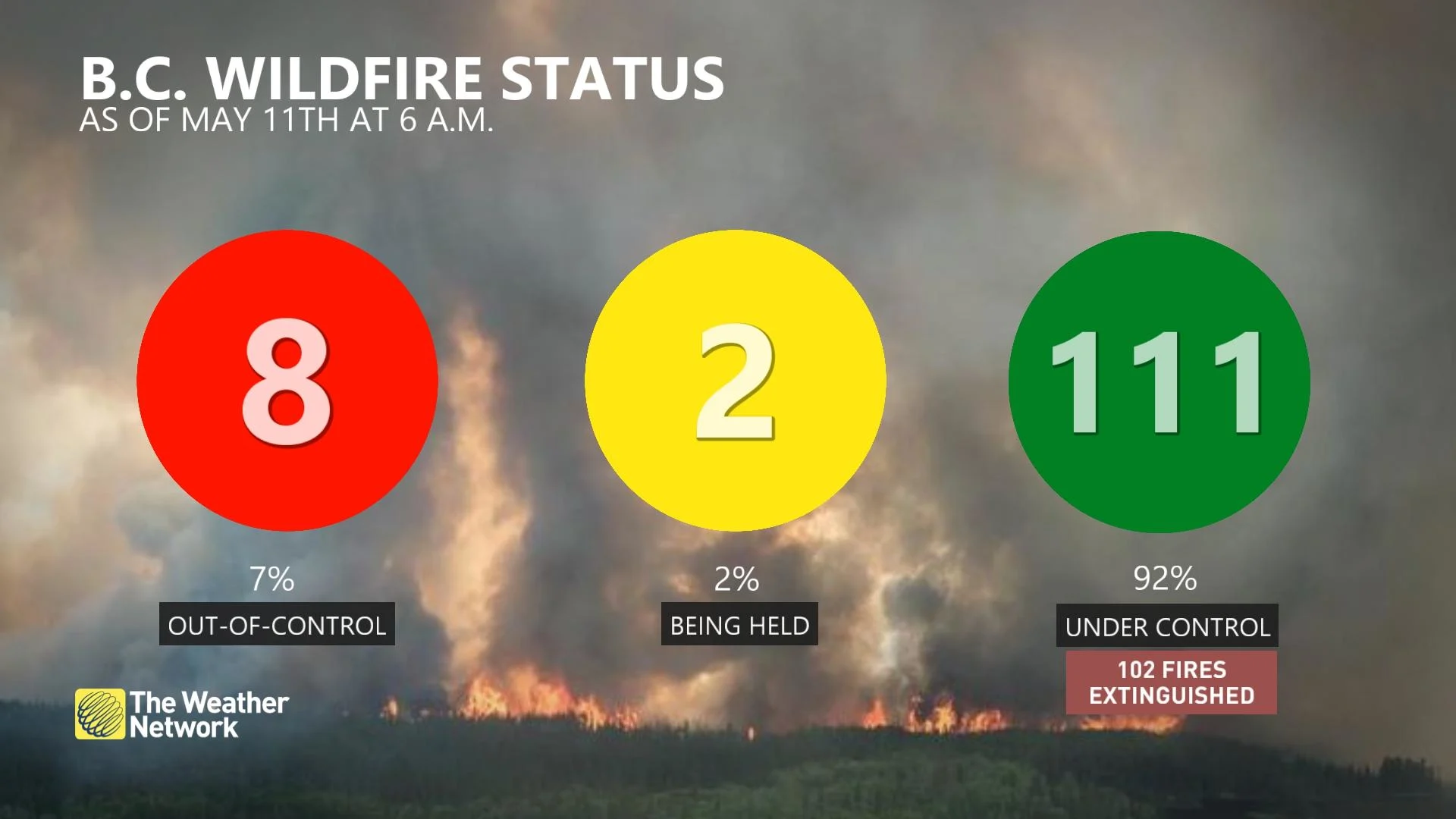
The service said at 10 p.m. PT the fire was 12 kilometres west of Fort Nelson, located near the border with Yukon, about 1,600 kilometres northeast of Vancouver and 500 kilometres north of Prince George.
It was fuelled by ongoing dry conditions in the region as well as strong winds, which were forecast to gust as high as 70 kilometres an hour.
Rob Fraser, mayor of the NRRM, said the fire started when high winds blew a tree over and it fell onto a power line, causing it to catch fire.
"And then by the time our firefighters were able to get down there, the wind had whipped this up into a fire that they weren't able to handle with the apparatus that we had," Fraser told CBC News on Friday night.
RELATED: Hopes for calmer B.C. wildfire season hinges on June weather
Speaking to CBC News again shortly before midnight, Fraser said the fire appeared to have continued advancing, estimating it was about nine kilometres from the community at that point.

Conditions had calmed with nightfall, he said, but the message to residents remained the same: " We want them to leave the community. We want them to be safe."
Blackout expected
Fort Nelson First Nation Chief Sharleen Gale said residents were co-operating with the order for the most part, though some who were farther from the flames and separated by a river had chosen to stay put.
She reiterated the message to leave for safety, and warned of an expected blackout for Fort Nelson, the Fort Nelson First Nation and the Prophet River First Nation, which receive electricity through natural gas.
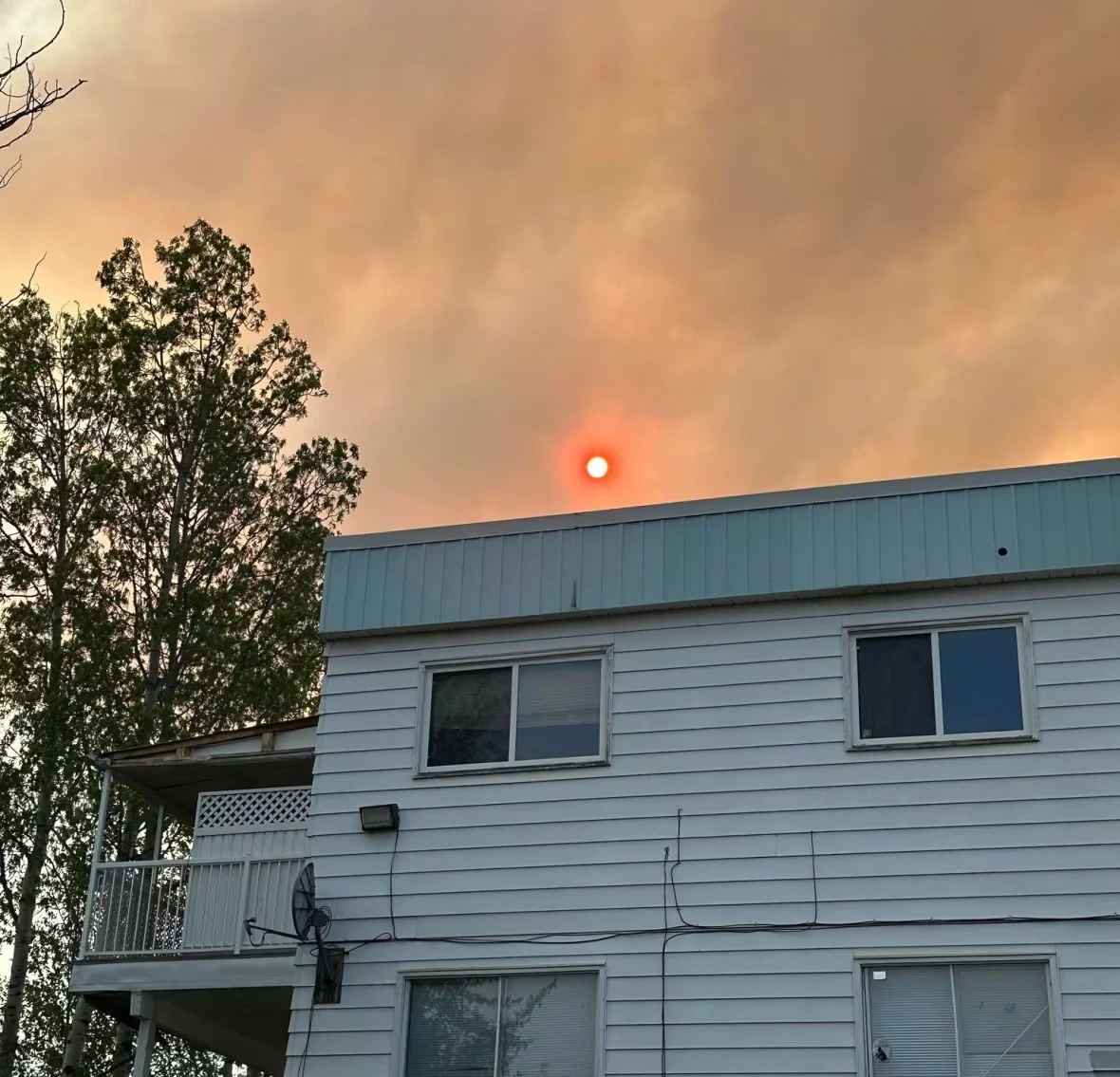
Wildfire smoke obscures the sun in Fort Nelson, B.C. on Aug. 10, 2024. (Danielle Sassie)
She said transfers of gas were being wound down as a precaution and a transfer station had burned down in a separate fire, limiting supply.
"We've done all we can," she said.
Gale and Fraser said they're expecting an update on the situation at around 10 a.m. Saturday.
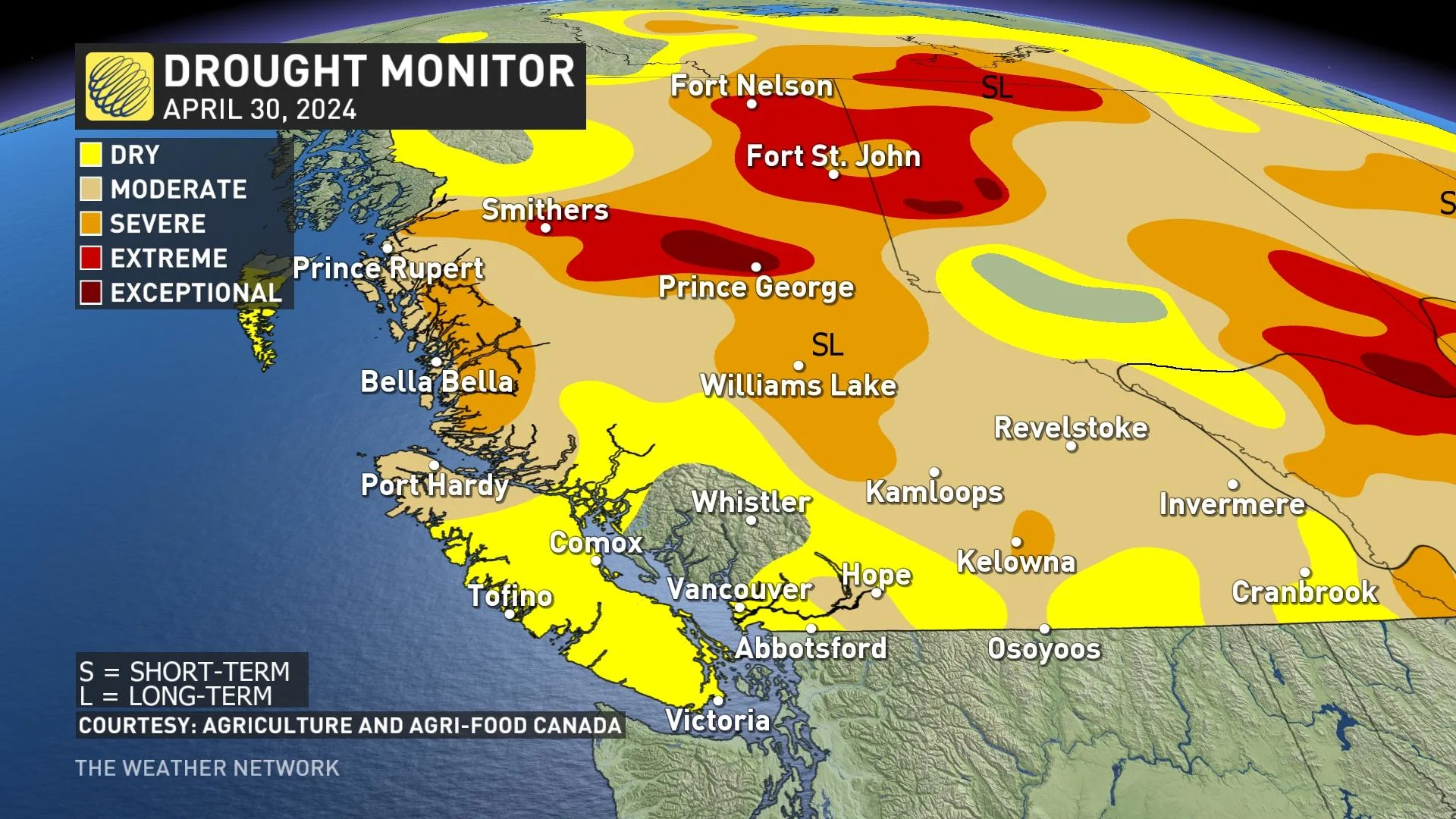
Evacuation details
The evacuation order for the region was issued by the Northern Rockies Regional Municipality (NRRM) and the Fort Nelson First Nation shortly before 7:30 p.m. PT on Friday.
"Residents are advised to evacuate the area immediately and begin driving south towards Fort St. John. If you have a recreational vehicle, or your own vehicle, fuel stations are being planned along the route south," the NRRM said in a Facebook post.
"If you know of and have the ability to take additional passengers who may need assistance or transportation, please consider doing so."
Evacuees were told to report to the North Peace Arena at 9805 96 Ave. in Fort St John — about 380 kilometres southeast of Fort Nelson — said Jessica Harrison, an information officer for Fort St. John Emergency Support Services.
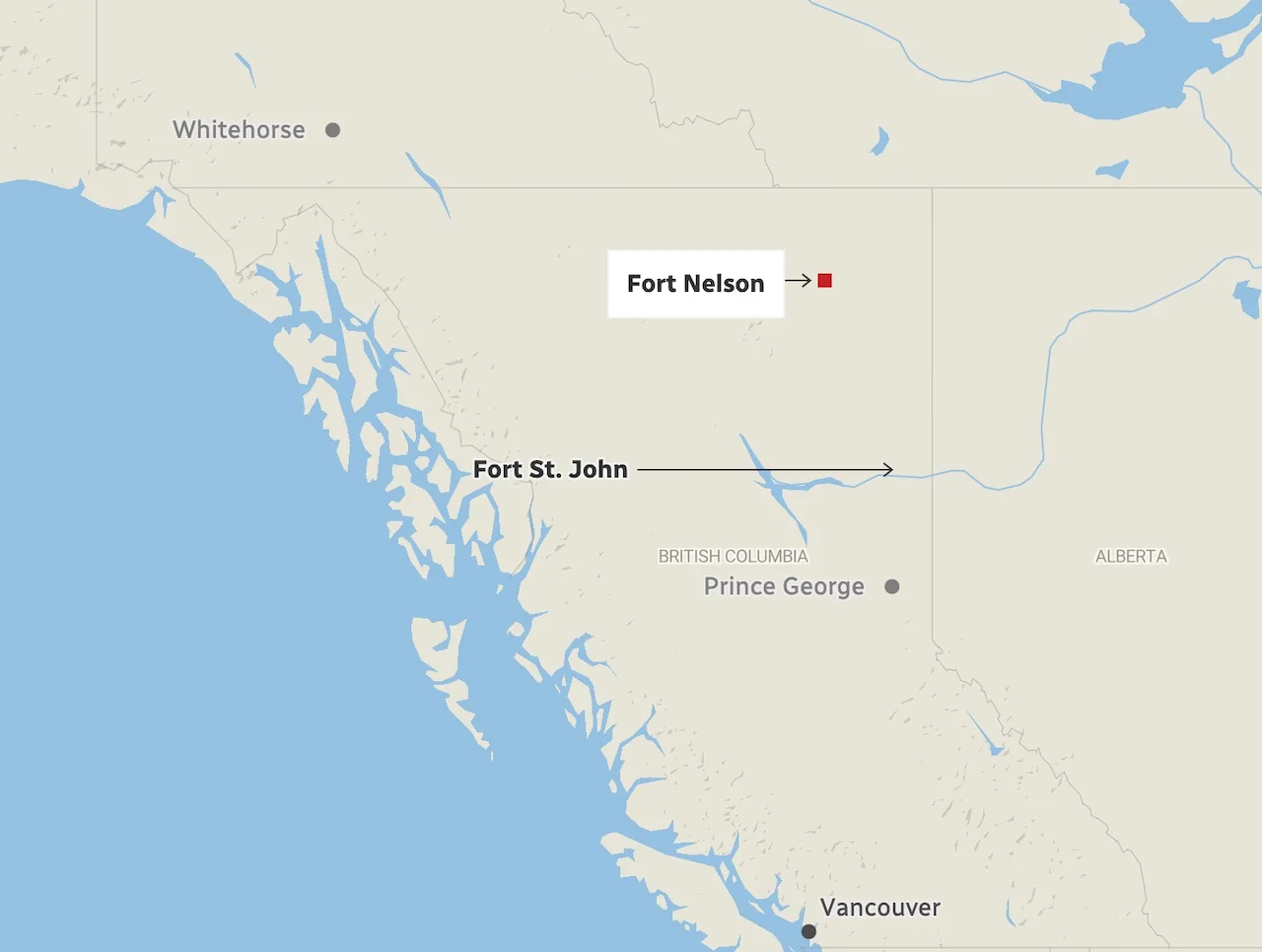
(OpenStreetMap contributors via CBC)
Long drive for evacuees
The fire closed Highway 97 with Highway 77 north of Fort Nelson closed due to another fire, according to Drive B.C.
That meant residents faced a roughly four-hour drive south on a single-lane highway along with hundreds of others to the city of Fort St. John.
Harrison, with Fort St. John Emergency Support Services, said she was expecting more than 3,000 people and have enough hotel rooms to shelter everyone.
"We're here at the ready to receive our neighbours," she told CBC News on Friday night. "We're looking forward to welcoming them, even though it's a stressful situation."
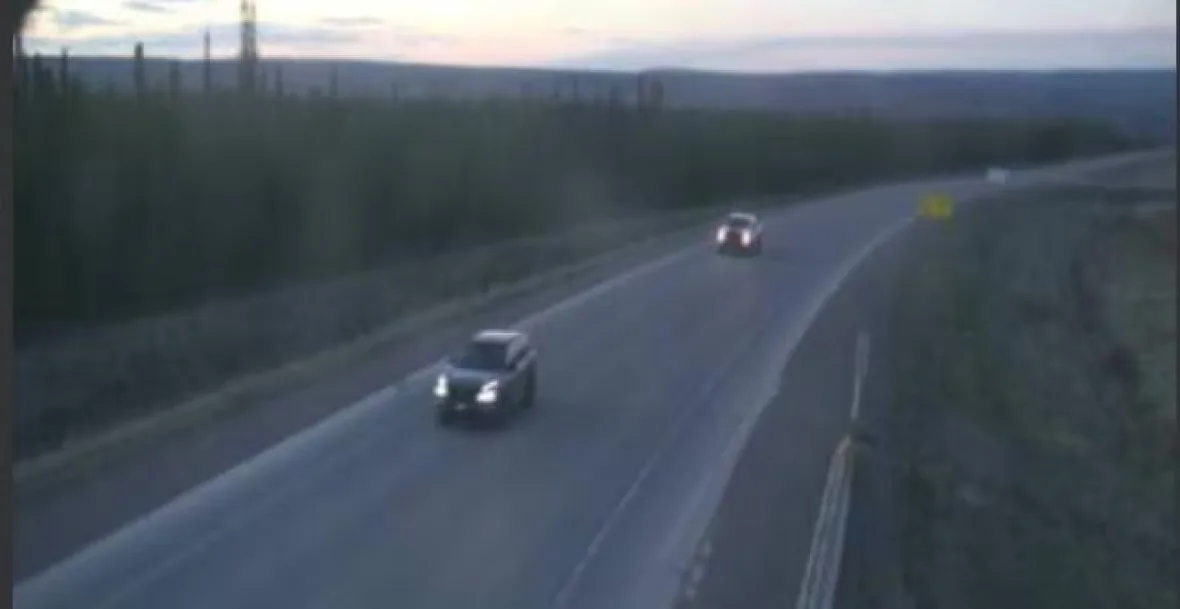
Highway camera footage of Highway 97 south of Fort Nelson as evacuees begin to make their way to Fort St. John. (DriveBC)
Anyone needing with transportation was advised to call 250-755-0933 and evacuees told to register on the Evacuee Registration and Assistance website at www.ess.gov.bc.ca, the district said.
The B.C. Wildfire Service (BCWS) said the fire is "highly visible" from the town, where approximately 3,400 people live, according to the most recent census.
Fire showing 'extreme' behaviour
The BCWS said Friday night the fire was exhibiting "extreme fire behaviour" fuelled by winds and dry conditions.
In at 10 p.m. update, the service said the fire was being fought by ground crews and nine helicopters bucketing water on the blaze, and air tanker support has been requested.
It said that in addition to wildfire service firefighters, members of the local fire department and the RCMP are involved.
B.C. Premier David Eby said on social media platform X that he was "thinking of people evacuated from Fort Nelson and Fort Nelson First Nation as wildfire activity grows close to their communities."
"B.C. Wildfire Service is responding and we will be working around the clock to support people."
Hospital being evacuated, phones impacted
The Northern Health Authority closed Fort Nelson General Hospital and had plans to evacuate all patients, including long-term care residents, to alternate locations in Fort St. John and Dawson Creek.
The Northern Rockies Regional Municipality has also warned that landlines in the region were affected, with 10-digit dialling unavailable.
Northwestel, which provides phone service in Fort Nelson, said in a Facebook post that wildfires have damaged telecommunications infrastructure, disrupting internet, phone and mobility services in parts of northern B.C., as well as parts of the Northwest Territories and Yukon.
"We are closely monitoring the situation and working to restore connectivity as soon as possible," they said.
Holdover fires from 2023 a threat
The fire comes the day after two sleeper fires from 2023 reignited in the area, prompting an evacuation alert and the deployment of crews to the area.
The Nogah Creek and Patry Creek wildfires, both near Fort Nelson went underground for the winter. They became what's known as sleeper fires — or more menacingly, zombie fires.
This spring, they both reignited after the snow melted and the ground thawed, explained Pedro Roldan-Delgado, an information officer for the B.C. Wildfire Service (BCWS).
Wind this weekend may exceed 70 kilometres per hour, and could shift direction rapidly, according to the BCWS. This creates the potential for extreme fire behaviour at both sites.
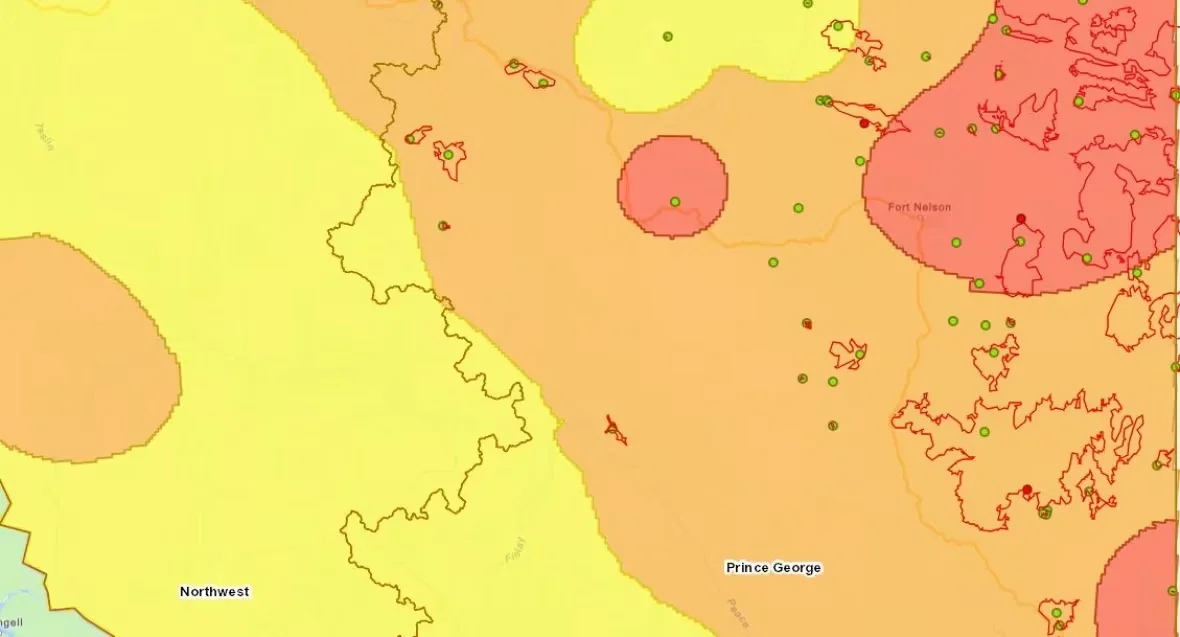
The fire danger rating around Fort Nelson, in B.C.'s far northeast, is rated as "extreme" (red) or "high" (orange). (BC Wildfire Service)
Fraser said earlier that residents are apprehensive of the "big dry storm coming through" this weekend.
"These fires are hold-over fires and if the winds pick up in that dry country, we're looking at a big major spread outside the current fire control area," Fraser said.
At the advice of the BCWS, the municipality issued an evacuation alert on May 9, warning residents who live near both fires that they need to be ready to evacuate on short notice. Fraser said the areas are mostly uninhabited, but include some oil and gas camps that may house around 30 people each.
The Nogah Creek fire is about 60 kilometres east of Fort Nelson, while the Patry Creek fire is about 40 kilometres from the junction of the Alaska Highway and Highway 77.
As of May 10, there are 119 active wildfires in the province, but only nine of those fires are categorized as out of control — including the Patry Creek and Nogah Creek fires.
Drought conditions
The evacuations and evacuation alerts come as the province reports a snowpack of 66 per cent of normal — a sharp decrease from last year's 91 per cent. According to the province, it's creating a significantly elevated drought hazard.
The BCWS has reported that the conditions around both fire areas resemble those of late summer, even though it's only May.
Fraser said that some locals are critical of the BCWS for not addressing the sleeper fires earlier, including during the winter when the Nogah Creek fire was accessible by road.
"But they didn't hire their crews until late in March, and so they just didn't get out there in time to get some of these fires out," he said.
B.C.'s 2023 wildfire season is widely regarded as the worst on record after about 400 structures were destroyed. Tens of thousands of people were evacuated from their homes, and wildfire damage cost insurance companies more than $720 million.
WATCH: How Canada is investing in the fight against wildfires
Thumbnail courtesy of Angela Klondike via CBC.
The story was originally written by and published for CBC News on Friday, May 10. It contains files from Andrew Kurjata, Moira Wyton, Tessa Vikander, Megan Turcato and The Canadian Press.









